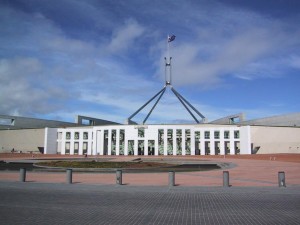Third Year Medicine (Undergraduate)
Monash University
Linh Nguyen
Fourth Year Medicine (Undergraduate)
Monash University
Wednesday, April 30th, 2014
 The vast field of medicine transcends the mere finding of cures for ailments, seeking approaches to prolonging life, and undertaking research in the pursuit of wellbeing, important as these duties are. However, medicine’s empathetic pledge to the ill requires us to exercise leadership, amongst other qualities, as an important tool to advance the interests of both the individual and the population at large. Practical leadership and advocacy is the cornerstone of the increasingly complex environment in which 21st century healthcare is provided. Patients, institutions and communities often perceive doctors as agents of change i.e. leaders. However, some physicians may have been marginalised by the healthcare system because they either do not receive good leadership and management training, or they occupy positions that require leadership and managerial skills, which they initially do not possess. This apparent lack of appropriate leadership and management development may preclude doctors from participating in essential roles to shape the delivery of health services. [1] The problem can be traced back to medical school, where relatively little, or perhaps non-existent emphasis is given to nourish medical students’ attitudes towards leadership. Current medical curricula offer students little leadership education of the kind considered necessary to develop competences essential in becoming actively involved in the planning, implementation and provision of patient care. [2]
The vast field of medicine transcends the mere finding of cures for ailments, seeking approaches to prolonging life, and undertaking research in the pursuit of wellbeing, important as these duties are. However, medicine’s empathetic pledge to the ill requires us to exercise leadership, amongst other qualities, as an important tool to advance the interests of both the individual and the population at large. Practical leadership and advocacy is the cornerstone of the increasingly complex environment in which 21st century healthcare is provided. Patients, institutions and communities often perceive doctors as agents of change i.e. leaders. However, some physicians may have been marginalised by the healthcare system because they either do not receive good leadership and management training, or they occupy positions that require leadership and managerial skills, which they initially do not possess. This apparent lack of appropriate leadership and management development may preclude doctors from participating in essential roles to shape the delivery of health services. [1] The problem can be traced back to medical school, where relatively little, or perhaps non-existent emphasis is given to nourish medical students’ attitudes towards leadership. Current medical curricula offer students little leadership education of the kind considered necessary to develop competences essential in becoming actively involved in the planning, implementation and provision of patient care. [2]
The Australian Medical Students’ Association (AMSA), being the peak advocating body for key affairs that concern medical students across the country, has identified this issue. It has responded by establishing the National Leadership Development Seminar (NLDS), an initiative aimed to assist motivated students interested in leading the medical profession. Each year, since its inception in 2005, NLDS attracts hundreds of applications from bright students who are keen to enhance their leadership skills. The seminar allows for approximately 90 applicants to participate annually. The NLDS program is carefully constructed to equip attendees with knowledge, skills and attitudes regarding leadership, advocacy and management, with a focus on current national health issues. The three-day seminar, which is held in Canberra, integrates guest speaker presentations, small group activities and interactive workshops to teach students how to link necessary leadership competencies with actual service opportunities.
The NLDS focus on leadership is closely aligned with Health LEADS Australia, a health professional leadership framework draft that has recently been published by Health Workforce Australia. The framework describes some of the most important leadership attributes that health workers who are involved in building a flourishing and sustainable health system should embrace and promote. This leadership framework is divided into five arms, including emotional intelligence and self-performance reflection, acknowledging the abilities of others whilst helping them to develop, and concentrating on achieving goals and pursuing innovative change. [3]
Although long term evaluation data is required to assess the effectiveness of NLDS (especially in meeting the key objective competences as outlined by Health LEADS Australia and Domain 4 of the Australian Medical Council’s Graduate Outcome Statements [4]), this program offers an innovative model of a leadership-based course. This can have a positive impact on leadership skills development among medical school students and can be incorporated into the medical school curriculum. We understand that NLDS has some limitations in terms of its primordial structure compared to other more established leadership programs in the realm of business and economics. These limitations include the program’s exclusivity to only a minor number of students per year, non-exhaustive coverage of all aspects of what it takes to become a successful leader in the clinical arena, and lack of networking past the event’s conclusion. Despite these drawbacks, NLDS is a unique national attempt to illustrate the importance of leadership in medical education. We invite medical schools to look at NLDS as a template whilst designing an innovative, socially accountable curriculum to engage students in the practices of advocacy, management and leadership.
Conflict of interest
None declared.
Correspondence
L Ngu: lngu45@student.monash.edu
References
[1] Abbas MR, Quince TA, Wood DF, Benson JA. Attitudes of medical students to medical leadership and management: a systematic review to inform curriculum development. BMC Med Educ. 2011;11:93.
[2] O’Connell MT, Pascoe JM. Undergraduate medical education for the 21st century: leadership and teamwork. Fam Med. 2004 Jan; 36 Suppl:S51-S56.
[3] Health LEADS Australia: Consultation for an Australian Health Leadership Framework: Health Workforce Australia; 2012. [cited July 2013]. Available from: http://hwaleadershipframework.net.au/files/HWA-HealthLeadershipFramework-forConsultation.pdf
[4] Accreditation Standards for Primary Medical Education Providers and their Program of Study and Graduate Outcome Statements: Australian Medical Council; 2012. [cited July 2013]. Available from: http://www.amc.org.au/images/Accreditation/FINAL-Standards-and-Graduate-Outcome-Statements-20-December-2012.pdf
